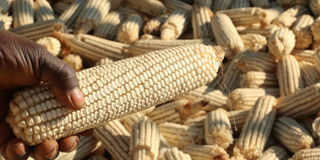Zimbabwe bans maize imports after rare big harvest

What you need to know:
- Zimbabwe has banned maize imports with immediate effect, the country's agricultural marketing authority said on Thursday, citing an expected big harvest of the staple crop in 2021.
Zimbabwe has banned maize imports citing a big harvest of the staple crop this year on the back of years of food shortages.
The southern African country last year spent $300 million on maize imports last year and donors were feeding more than half of the population due to successive droughts.
Zimbabwe is expecting to harvest 2.7 million tonnes of maize this year, which is three times last year’s output and is more than annual consumption.
It would be the first time the country will have a maize surplus after almost two decades of food shortages following a chaotic land reform programme at the turn of the millennium.
The good cropping season is attributed to higher than normal rainfall during the just ended 2020/21 rain season.
“The Agricultural Marketing Authority will no longer be issuing out import permits for maize and maize meal,” said Clever Isaya, the authority’s chief executive officer.
The state agency has a monopoly on buying and selling maize from farmers.
According to the government’s latest crop and livestock assessment report, the country will harvest 2,7 million tonnes of maize during the 2020/21 summer cropping season, the highest yield in 20 years.
Zimbabwe’s maize harvest will be nearly 200 percent higher than last year and 130 percent above average.
The southern African country expects to get a surplus of over 820 000 tonnes of cereals this year, the highest yield since the 2000/01 season when the late strongman Robert Mugabe began the violent seizure of white-owned commercial farms.
His controversial land reforms led to the collapse of Zimbabwe’s ago-based economy and spawned large-scale food shortages with aid agencies still feeding more than half of the country’s population to date.
After consecutive droughts, the country received above normal rainfall during the just ended farming season, which led to bumper harvests across the country.
The United States sponsored Famine Early Warning Systems Network (FewsNet) said the “above-average harvest is driving increases in agricultural labour opportunities, especially in typical surplus producing areas.”
FewsNet, however, warned that Zimbabwe’s humanitarian crisis was not yet over due to the country’s ongoing economic problems that have dragged on for over two decades.





